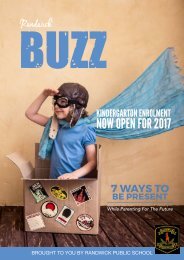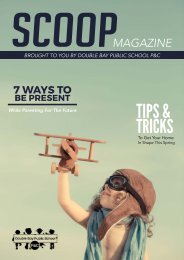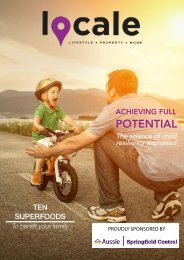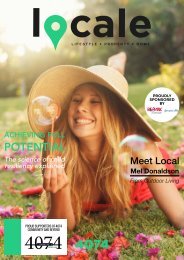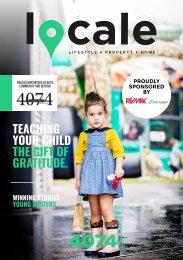BUZZ - Term 2 - 2016
Create successful ePaper yourself
Turn your PDF publications into a flip-book with our unique Google optimized e-Paper software.
BROUGHT TO YOU BY RANDWICK PUBLIC SCHOOL
TAEKWON-D<br />
The Korean Art of Self-Defe<br />
TAEKWON-DO<br />
The Korean Art of Self-Defence<br />
Randwick Public School, Thursdays from 5.30pm<br />
Classes for ALL ages and stages, 5 years and above<br />
**Other classes available through the week at ITFA HQ, Level 3, 48 O’Riordan St,<br />
Alexandria, NSW 2015.<br />
Randwick Public School, Thursdays from 5.30pm<br />
FREE TRIAL CLASS!<br />
Classes for ALL ages and stages, 5 years and above<br />
Contact: 0450 459 927 or<br />
info@itfa.com.au<br />
www.ITFA.com.au<br />
**Other classes available through the week at ITFA HQ, Level 3, 48 O’Riordan St,<br />
Alexandria, NSW 2015.<br />
FREE TRIAL CLASS!<br />
Contact: 0450 459 927 or<br />
info@itfa.com.au<br />
www.ITFA.com.au
What Parents Need to Know about Aussie Teenagers:<br />
10 ways to help your kids thrive<br />
4<br />
Pornography, peer pressure, perfectionism to<br />
conform to social media, split families, self-harm,<br />
parental pressure to succeed, cyber bullying<br />
and gaming are all concerns of teenagers today,<br />
according to the ABC 4Corners documentary Our<br />
Kids.<br />
In a telling episode, Australian kids from the age of 12<br />
year to 19 years shared a glimpse of their inner world and<br />
what their hopes, fears and dreams are for the future.<br />
While many of the concerns are not dissimilar to<br />
previous generation of teenagers, the explosion<br />
of social media has expanded the horizons of our<br />
teenagers and is having a dire impact on their selfimage,<br />
increased exposure to world events such as<br />
terrorism and over use of technology.<br />
Cyber bullying is wreaking havoc with teenage<br />
girls as well as the pressure to conform to the<br />
perfection that girls are seeing their friends on<br />
Instagram, Snapchat or Tumblr. A twelve year old<br />
girl in the program told of her need to belong to<br />
the ‘in group’ and used social media to compare<br />
herself to others – to make sure she had the latest<br />
white converse, the triangle bikini and Marc Jacob<br />
jeans and watch.<br />
Another concern for teenagers was the added<br />
pressure of parents wanting their kids to do well<br />
at school. These kids were concerned that their<br />
parents are putting huge, unnecessary pressure on<br />
kids to succeed at school as well as to participate<br />
in an ever increasing amount of extracurricular<br />
activities and tutoring. One girl talked about how<br />
she was in the top maths group but her mum<br />
doubted her. ‘I’m going to fail every test according<br />
to mum’.<br />
An alarming statistic in the program revealed that<br />
30 per cent of 11-17 year old boys spend up to<br />
3 hours a day gaming – more on weekends and<br />
it is affecting boys ability to use their time well.<br />
One boy said ‘I don’t have time for homework’.<br />
They are mostly playing the game ‘call of duty’<br />
against each other in virtual online worlds and<br />
while gaming can have positive ramifications to<br />
help kids think outside the box, problem solve<br />
and build a community, there needs to be strong<br />
boundaries and rules in place from the parents<br />
to balance it with other activities, including<br />
homework and sport.<br />
The major concern for this age group, especially<br />
among girls is the widespread use of self-harm.<br />
Self-harm is dubbed the ‘new anorexia’ and<br />
scarily enough this age group do not see it as<br />
dysfunctional because it is so rife. Around 135,000<br />
kids have self-harmed this past year. It is strongly<br />
related to poor mental health and can take its toll<br />
on all aspects of the teenager’s life.<br />
Mental health in our teenagers today is at an alltime<br />
low with one in four teens currently have<br />
a mental health condition (including anxiety,<br />
depression and substance abuse) and a quarter<br />
also saying they are unhappy with their lives.<br />
Access to pornography is altering the view boys<br />
have of girls. By the age of 10, every boy will have<br />
seen porn online and this is impacting on sexual<br />
relationships and intimacy between boys and girls.<br />
The common thread throughout the episode that<br />
relieved stresses and pressures in teenager’s lives<br />
was physical activity and strong relationships.<br />
So what role can parents play in the lives of their children<br />
to ensure they thrive though the teenage years?<br />
1. Start early<br />
By the time your child is a teenager, you have<br />
already sown the seeds of independence,<br />
love, trust, respect, good mental health,<br />
resilience, confidence, self-esteem and habits<br />
around technology. You have already built<br />
your relationship and while none of these are<br />
irreparable with a teenagers, they are easier to<br />
develop from the moment our children are born,<br />
than to suddenly input when your children are<br />
teenagers.<br />
2. Build a solid relationship from the start<br />
Extensive and widespread research shows that<br />
building a strong parent-child bond early is the<br />
number one factor to raising a resilient child.<br />
When a child feels loved, nurtured and a sense<br />
of significance and belonging from just one<br />
adult (ideally a parent or parent figure), they<br />
have stronger mechanisms to bounce back from<br />
adverse situations than their counterparts who<br />
have formed negative or no relationships with an<br />
adult and to make good decisions. The relationship<br />
starts the very moment you hold your child in your<br />
arms and it looks at you. Right from that moment,<br />
you are forming an important bond that will last<br />
a lifetime. Like any relationship, it needs to be<br />
nurtured and effort needs to be fed into it to make<br />
it work. One on one time is important, speaking<br />
respectfully, building the relationships on love and<br />
cuddles, creating micro moments of connection<br />
and acknowledging how special your child is<br />
to you, are all important in building a strong<br />
relationships.
3. Set clear boundaries and expectations<br />
Just like adults, children are creatures of habit and<br />
love to follow rules when they are young. If you<br />
can set clear boundaries and expectations early,<br />
they will know exactly where they stand with you<br />
and in their environment. You will help them make<br />
sense of the world around them, form good habits<br />
and ideally make good choices when faced with<br />
everyday problems. When you set the boundaries<br />
and expectations, be consistent. Follow through on<br />
what you say and let your child feel safe and secure<br />
in their environment with you.<br />
4. Be the role model<br />
As a parent, you are your child’s first role model.<br />
If you have watched your children closely for a<br />
few hours or listened to them speak, you will hear<br />
and see snippets of your most common sayings<br />
or mannerism come out in their play time or voice<br />
as they mimic you. Provide your child with an<br />
environment and role model that is upbeat and<br />
gives your child hope and a positive attitude to<br />
move through their day. Young children react to<br />
whatever mood or state of mind you are in. If you<br />
are always stressed and in a hurry, they will pick<br />
up the vibe and develop a similar habit. Take time<br />
to stop and be with your kids. Have fun with them<br />
at the park or at the beach. Take them on nature<br />
walks. Think of who you needed around you when<br />
you were a child and be that person.<br />
5. Meet children in the moment<br />
Children live in the moment so meet them there.<br />
Don’t overload them with your own stresses and<br />
worries we carry with us as adults, both past and<br />
present. A child’s biggest concern in their day are<br />
generally meeting their own basic needs – food,<br />
water, sleep, safety and love. Meet your kids there.<br />
6. Don’t over catastrophize the situation<br />
The part of the child’s brain that deals with<br />
emotions and rational decision making is<br />
underdeveloped. The prefrontal cortex doesn’t<br />
fully develop until the age of 22. However, as adults<br />
we already have a fully functioning rational brain.<br />
We need to use our skills to calm a situation down<br />
and don’t over catastrophize it. Because of an<br />
underdeveloped brain as a child, their response is<br />
irrational and so through words, actions and role<br />
modelling we can use our rational brain to invoke<br />
calm and coping strategies for certain situations<br />
that doesn’t result in a full blown catastrophe.<br />
7. Let children experience disappointment<br />
Our natural propensity as a parent is the ‘fix’.<br />
However, if we continue to fix every disappointment<br />
our child faces, they are not going to develop their<br />
own strategies to cope with the ups and downs<br />
of life and the disappointment that results from<br />
that. So ‘be’ with your child when they experience<br />
disappointment and tell them how much is sux that<br />
they didn’t get into the cricket team or the choir.<br />
Problem solve ways to help them get over it.<br />
8. Recognise emotions and strategies to deal with them<br />
By helping a child recognise their own emotions<br />
and develop strategies to deal with them, we are<br />
allowing them to again navigate the ups and downs<br />
of life. The big emotions that press parent’s buttons<br />
are anger, frustration and sadness that generally<br />
result in an emotional outburst in some form from<br />
our child. Let your child experience these emotions,<br />
name them and put strategies in place to deal with<br />
them. Assure your child it is OK if they feel these<br />
emotions as long as they know how to move on<br />
from them.<br />
9. Shape a positive inner critic<br />
For good mental health, we need to help our<br />
children develop a positive inner critic. They<br />
need to be self-confident and self-assured to<br />
back themselves in difficult situations and to<br />
make good choices. By teaching our children<br />
to love themselves and be kind to themselves,<br />
we are setting them up for being able to deal<br />
with setbacks, making mistakes and failure. To<br />
encourage self-confidence, our children need to<br />
feel a sense of significance. Let them perform that<br />
dance concert with bad dance moves and terrible<br />
music. Let them experience new things and take<br />
risks. Let them say no and assert themselves and<br />
learn from that experience. And use positive selftalk<br />
yourself – don’t criticize yourself in front of<br />
your children.<br />
10. Discipline with respect and love<br />
Every children will need discipline at some point<br />
and some more than others. When you are<br />
disciplining your child, remember it is the behaviour<br />
you are correcting – not the child. Don’t shame<br />
them or criticize them as a person. Speak to your<br />
child like you would talk to your best friend or your<br />
work colleague – with respect. Give lots of cuddles<br />
and use discipline as a teachable moment to learn<br />
from rather than a time to berate or shame.<br />
Anna Partridge is a Parent Education, School Teacher and Mother to<br />
3 kids. She is passionate about working with families to help them<br />
raise confident and resilient children.<br />
http://www.annapartridge.com<br />
About Anna:<br />
Anna Partridge is<br />
a certified Positive<br />
Discipline Parent<br />
Educator, a school<br />
teacher and a mother to<br />
three highly spirited, beautiful children. She<br />
loves nothing more than helping parents<br />
raise resilient and confident children, build<br />
strong and connected family relationships<br />
and strive for calm, fun and happy families.<br />
http: /annapartridge.com/
June was an exciting month (in more ways than one) for the band<br />
program. We had a band camp booked and an upcoming mid-year<br />
concert, which is the first real opportunity for parents to hear how our<br />
young musicians are progressing this year.<br />
The weekend of band camp, unfortunately, coincided with an extreme<br />
weather event and on Sunday 5 June, day 1 of band camp the bus set off<br />
for the venue in Chatswood, only to be turned back due to flood waters.<br />
So with some quick thinking, it was decided to bring the students back to<br />
the school hall and run the band camp at school for the 3 days.<br />
Special mention should be made of the terrific efforts of our conductor<br />
Megan Lipworth, the school staff (Susan Allen, Caroline Antoun and<br />
Michael Brown) for their support, guidance and ability to solve the many<br />
logistical problems we encountered over the three days.<br />
Also, in particular, there were some outstanding helpers in the band<br />
committee (GulerErdonmez, NageswariSivarajah, Samantha De Costa,<br />
Sarah Brill, Shilpi Joshi, Wanda Blum), for their support and generous help<br />
preparing meals for all the children attending the camp. And of course, a<br />
big thank you to all the parents for their patience, flexibility and support<br />
in accommodating the changed plans.<br />
The band camp was a huge success with our CPB learning three new<br />
pieces, that were refined with intensive tutorials and rehearsals over the<br />
three days. We are all looking forward to hearing the CPB perform at the<br />
upcoming mid-year concert in the school hall at 5pm on Saturday 18<br />
June, where the training band will also perform.<br />
6
Randwick Public School P&C<br />
Positions vacant<br />
Fundraising Coordinator and team<br />
The P&C fundraising coordinator works<br />
closely with senior school staff, the school<br />
community and P&C executive to organise<br />
and communicate fundraising and special<br />
events for the school. Each year we aim<br />
to raise approximately $50,000 - $70 000<br />
and the expenditure is allocated to various<br />
programs at the AGM. Over the past year,<br />
the P&C has paid for literacy and numeracy<br />
programs, student leadership programs,<br />
band expenditure, kitchen garden program,<br />
digital citizenship program and supported<br />
many other areas of our children’s education.<br />
We are looking for a P&C fundraising<br />
coordinator to commence from the next<br />
AGM (November <strong>2016</strong>). We are also<br />
looking for a small team of people to<br />
take on the following annual events and<br />
responsibilities:<br />
<strong>Term</strong> 1<br />
Back to school BBQ – organises logistics,<br />
communications/promotion materials and<br />
co-ordinates with the stall managers.<br />
Easter Raffle - organises ticket & prizes,<br />
communications/promotion materials and<br />
logistics. This event would suit a small<br />
team of parents.<br />
<strong>Term</strong> 2<br />
Olympathon (or similar) – school staff<br />
organise the logistics and we support<br />
them by finding volunteers and setting up<br />
flexischools to collect money.<br />
<strong>Term</strong> 3<br />
Artwork fundraiser – order and distribute<br />
the art paper templates to the teachers,<br />
distribute order forms to parents,<br />
communications/promotion, set up<br />
flexischools for payment.<br />
Trivia night – as this will be Adriana’s last<br />
year organising our fabulous Trivia night,<br />
we are forming a small team to manage<br />
the event. Please contact Lindy Walsh at<br />
lindywalsh@gmail.com if you are interested<br />
in joining the team or finding out more!<br />
<strong>Term</strong> 4<br />
End of year BBQ – as for Back to school<br />
BBQ but on a larger scale.<br />
Each event in itself is not a huge<br />
undertaking and you will be supported<br />
with a full handover and assistance<br />
from the fundraising coordinator where<br />
required. If you are interested in running<br />
one of the above events or would like<br />
to find out more about the fundraising<br />
coordinator’s role, please contact the<br />
following people:<br />
Sue Hammermaster/Leanne Bergan:<br />
randwick.pc.fundraising@gmail.com<br />
Terry Daley, P&C President:<br />
randwick.pc.president@gmail.com
When did you learn to touch-type?<br />
Give your child the gift of Touch-Typing!<br />
* Touch-typing is an essential life skill in today's<br />
computer world!<br />
* Touch-typing, when taught early, will stay learned<br />
forever!<br />
* Touch-typing will make homework faster and easier!<br />
* Touch-typing will be an invaluable skill addition to<br />
any CV!<br />
* Learning Touch-typing is fun, improves dexterity,<br />
memory and focus!<br />
NOW taking Enrolments<br />
Conveniently located at your school!<br />
Can you afford NOT to teach your child to<br />
Touch-Type?<br />
Spaces are limited!<br />
To secure your space, contact us now!<br />
Judy Korlaki info@typing4kids.com.au 0415 445 785<br />
9
P&C<br />
President’s Report<br />
The new school accommodation plans<br />
The plans for the new school have been lodged with<br />
Randwick Council. We are very excited to be able<br />
to share one of the elevation drawings with you. If<br />
you want to see more you can go to the DA section<br />
of the Randwick Council website, and search for<br />
DA-338/<strong>2016</strong>.<br />
The construction is currently targeted to commence<br />
in September. We are currently in negotiation with<br />
the Education Department over the allocation of<br />
new playground space between Randwick Public<br />
and The Centennial School. We will report back on<br />
the outcome of those discussions.<br />
The P&C needs your help<br />
For the past three to four years the school has been<br />
incredibly fortunate to have the dedicated support<br />
of a core group of committee members. With how<br />
effortlessly this team has functioned, we have never<br />
been had to make a cry for help like this before.<br />
Unfortunately we are losing a large number of<br />
volunteers this year, and that is where you come in.<br />
We are desperately seeking some replacement<br />
volunteers to fill the following positions.<br />
• Fundraising coordinator: Sue Hammermaster has<br />
spent four very successful years as the heart of our<br />
successful fundraising. She is more than happy<br />
to work on a smooth transition to one or more<br />
replacements. This role is the very heart of our P&C.<br />
• P&C Secretary: Leanne Bergan has held the<br />
position of Secretary for three years, and as<br />
much as we want her to continue, the rules do<br />
not allow it. So we really need someone who<br />
can support the executive. Typing skills would<br />
be helpful.<br />
• Uniform Shop: For the past few years the<br />
uniform shop has never been in better shape.<br />
Mindy Alker has performed an amazing job as<br />
the uniform shop coordinator. She could not<br />
have done this without the help of the uniform<br />
shop committee members: Mike Faulkner,<br />
VickeyMoyes, Edwina Stratton, Liz O’Connell,<br />
and Aarti Daly. They have all decided that it is<br />
time to hand over the reigns. You do not have<br />
to commit to every week and you don’t need<br />
experience.<br />
If you were to ask them, each one of those wonderful<br />
volunteers would say how rewarding their stints in<br />
the P&C have been. It really allows you to become<br />
part of our very warm school community, and help<br />
your kids at the same time.<br />
I would encourage each of you to give some<br />
consideration to making a contribution in whatever<br />
capacity. We would love to hear from you. Please<br />
send your details to randwick.pc.secretary@gmail.<br />
com and we will happily discuss the options and<br />
what’s involved.<br />
Working Bee<br />
You may be aware, but the recent wet weather<br />
literally put a dampener on the planned Working<br />
Bee, so it has been re-scheduled for Sunday 24th of<br />
July. It would be great if you could come along to<br />
help keep the school in tip-top condition. Even one<br />
hour would be greatly appreciated.<br />
Terry Daly<br />
Randwick P&C<br />
President
Our Holiday FUN program in our Randwick Studio is designed<br />
to improve your skills, help you work on your technique and<br />
of course - discover the fun of music! We offer intensive<br />
music lessons, accelerator programs, and our unique<br />
Wired4Sound Musical Fun sessions! So there are school<br />
holiday options for everyone! Numbers for all sessions are<br />
strictly limited, click here to ENROL TODAY!<br />
Private Lessons<br />
Wired 4 Sound -<br />
MUSICAL FUN!<br />
Open to ALL Students, ages 5<br />
to 12 years, NO Musical<br />
Experience is Required! $25 per<br />
session 10am - 12pm<br />
'The Gruffalo' (5-8yrs)<br />
Tuesday 12th July.<br />
Glee: Sing & Move! (5-12 yrs)<br />
Wednesday 13th July.<br />
Rhythm Cups & More! (5-12<br />
yrs) Thursday 14th July.<br />
Instrument Accelerator<br />
Workshops!<br />
Specialist Ensembles - $25 per<br />
session - 1.5 hours duration<br />
Flute Choir: Tuesday 12th July<br />
(10am-11.30am)<br />
Clarinet/Saxophone Ensemble:<br />
Tuesday 12th July (12.30-2.00pm)<br />
Brass Brand: Wednesday 13th<br />
July (10am-11.30am)<br />
Strings Ensemble: Thursday 14th<br />
July (12.30-2.00pm)<br />
30 mins ($38) or 60 mins<br />
($76) 11am-1pm - both weeks<br />
of the school holidays: Brush<br />
up on your skills or give your<br />
technique a blast with some extra<br />
private lessons...get ahead for term 3!<br />
Week 1 (11am-1pm) : Flute - Tues<br />
5th & Thurs 7th. Clarinet/Sax - Tues<br />
5th & Thurs 7th. Brass - Wed 6th.<br />
Strings - Fri 8th Piano - Tues 5th &<br />
Wed 6th Voice - Tues 5th & Wed 6th<br />
Week 2 (11am-1pm) :<br />
Flute - Tues 12th & Thurs 14th<br />
Clarinet/Sax - Tues 12th & Thurs<br />
14th. Brass - Wed 13th Strings - Fri<br />
15th. Piano - Tue 12th & Wed 13th<br />
Voice - Tues 12th & Wed 13th<br />
Call or visit our website for more information directionsinmusic.com.au 02 9662 2211<br />
CLICK HERE to enrol!
Kitchen Garden News<br />
Due to the recent wet and cold weather and with building works looming, we<br />
have organized respite on a farm for our goats, Thelma and Louise. While the<br />
goats have been a source of enjoyment for many of us we felt it was only fair to<br />
them to give them some peace and quiet for a while.<br />
I’d like to take this opportunity to thank everyone who has been involved in the<br />
care of our goats and to everyone else who enjoyed and supported having them<br />
at the school.<br />
We are hopeful that once building work is nearing completion we can look to<br />
organize better accommodation for them and consider bringing them back to<br />
the school.<br />
In the meantime we have plenty of chickens who are most interested in your<br />
scraps, a pond rehabilitation project marked for the next working bee, new seedlings<br />
growing in the greenhouse, and a steaming compost that is also willing to<br />
take your scraps should you wish to bring them in (and would never say no if you<br />
felt like a bit compost turning).
Take a back seat Hollywood,<br />
RPS’s very own cast of multitalented<br />
Stage 3 students<br />
have finally hit the STAGE<br />
and ……………WHAT AN<br />
EVENT IT WAS!<br />
HSM<br />
Comes to<br />
Randwick<br />
Public<br />
School<br />
Jocks, Brainiacs, Thespians and Skater<br />
Dudes find their cliques, recount their<br />
vacations and look forward to their<br />
new school year. Through twists and<br />
turns and many teenage challenges,<br />
the whole school comes together as<br />
winners on stage and on the court as<br />
the Wildcats win the championship<br />
game and Gabriella excels at the<br />
Decathalon. Troy and Gabriella (aka<br />
Will and Jessamy), emerge as true<br />
High School Musical sensations after<br />
stage darlings Sharpay and her overly<br />
helpful brother, Ryan (aka Millie and<br />
David) try to wreak havoc! And let’s<br />
not forget quirky Ms. Darbus (aka Mila)<br />
the matriarch of theatre and of course<br />
Coach ….’Getcha head in the Game’<br />
Bolton (aka Archie). 13
Why we should be worried about our kid’s mental health:<br />
Insights from Education and Parenting Leaders<br />
At the Sydney Positive Schools Conference on<br />
Thursday 9th June <strong>2016</strong>, well known parenting<br />
expert, psychologist and educator, Michael Carr-<br />
Gregg said that on average 8 kids in every class<br />
in Australian schools is currently experiencing a<br />
mental health issue. Alarm bells should be ringing.<br />
If that’s not enough, coupled with this statistic is the<br />
research that shows 41 per cent of Year 12 students<br />
experience some form of anxiety and 31 per cent<br />
have major depressive disorders. Australia is also<br />
experiencing it’s highest rate of suicide in 13 years.<br />
For girls aged between 16 and 19 years, suicide rates<br />
have doubled since 2008. Right now, 8 people every<br />
day in Australia are taking their own lives.<br />
‘Imagine if this was a skin eating virus in Sydney<br />
that was claiming 8 lives per day. Do you think the<br />
government might take it seriously then?’, Mr Carr-<br />
Gregg said.<br />
Michael Carr-Gregg went on to say that the major<br />
concerns affecting the mental health of our<br />
teenagers are coping with stress, schoolwork and<br />
body image. These concerns are not dissimilar to the<br />
concerns teenagers had 25 years ago.<br />
So why are these concerns having such a huge impact on<br />
our kids mental health in <strong>2016</strong>?<br />
The Positive Schools Conference was focused on<br />
the social and emotional wellbeing of our schoolaged<br />
children and was attended by more than 500<br />
educators, psychologists, counselors and parenting<br />
educators. As a summary of the two-day conference<br />
presentations, these are the reasons our kids are<br />
now suffering.<br />
Communities have dwindled. There is no longer the<br />
aunt, uncle, mother best, long-time friend for the<br />
kids to talk to. That lovely neighbour who knows<br />
the family who watched out for the kids is no longer<br />
there. There is no village raising our kids and so the<br />
crucial conversations are not taking place. There is<br />
peer-to-peer talk happening without guidance and<br />
reassurance.<br />
Kids are less exposed to risk. Being allowed to climb<br />
a tree, play in the creek or ride bikes around the<br />
neighbourhood are a thing of the past. When doing<br />
these activities there were valuable opportunities<br />
to learn to bounce back from adversity and develop<br />
intrinsic coping mechanisms. Now, our playgrounds<br />
are too safe. We are so concerned our kids might<br />
hurt themselves; we have built soft fall playgrounds<br />
everywhere and low monkey bars. There are no<br />
seesaws to smack you in the chin and no swings to<br />
go as high as you could.<br />
The pressure to be perfect is heightened. There is little<br />
opportunity for our kids to make mistakes and<br />
improve. We are so focused on how our kids are<br />
doing in NAPLAN that we forget to see how they<br />
are doing socially and emotionally. Our kids are<br />
conforming to perfection and not taking risks to<br />
fail and learn. When they are so focused on doing it<br />
right, they loose the drive to do it at all.<br />
We live in a ‘hurry up’ culture. The pace of our lives has<br />
increased. We are constantly on a treadmill from one<br />
place to the next. For kids, who naturally live in the<br />
moment, there is little time to play, learn and for us<br />
to teach. The number of children who can no longer<br />
tie their shoelace at the age of 6 is alarming. Parents<br />
have no time to teach their kids to tie shoelaces.<br />
More importantly, there is reduced time for the<br />
crucial conversations with our kids because we are<br />
running around so much. It is a rush to get the kids<br />
home, fed, bathed and into bed before we wake the<br />
next morning to start again on the treadmill.<br />
How can we as parents and teachers support our kids in<br />
this generation?<br />
Here are 8 insights from the leaders on education<br />
and parenting from the Conference.<br />
1. Build respectful relationships based on love and care<br />
Our kids thrive in environments where they feel<br />
significant and loved. They are more likely to have<br />
the crucial conversations with the people who<br />
make them feel special and loved. Well known<br />
Australian parent educator, Maggie Dent coined<br />
the term ‘micro moments of connection’ which are<br />
those special, little moments like a wink, high five,<br />
spontaneous dance in the kitchen or the ‘I love<br />
you’ symbol you make up with your kids are more<br />
important for building a relationship than scheduled<br />
one on one time once a month. It is not just the<br />
responsibility of parents and teachers to build these<br />
relationships; it is the responsibility of anyone who<br />
is in the lives of a child. Build these relationships to<br />
broaden their community of trusted people. Bring<br />
back the village.
2. Let kids experience risk<br />
The risk obviously needs to be age appropriate and<br />
calculated like climbing a tree at the age of 3 or 4<br />
or learning to surf at 7 or 8 years of age. When we<br />
are less fearful about the world, our kids will be. We<br />
need to let them go little by little so by the age of 18<br />
or 19, they are independent enough to leave home<br />
and make good choices.<br />
3. Give our kids mechanisms to cope<br />
Our kids have fewer mechanisms to cope than we<br />
did. Maybe it is because they don’t experience the<br />
risk to develop these mechanisms or maybe it is<br />
because we don’t teach it to them. Developing<br />
emotional intelligence and understanding and<br />
recognizing their own emotions in important. As<br />
is having strategies to deal with their emotions.<br />
Knowing how to get of the treadmill of our ‘hurry up’<br />
culture is a valuable mechanism to cope with stress<br />
and might be through mindfulness, meditation,<br />
guided visualization or something like using the<br />
‘Smiling Minds app’ regularly. By the age of 10, kids<br />
should have at least 5 strategies they can do to cope<br />
with stress. These strategies will change as they<br />
change their interest and circumstances.<br />
4. Find what your child loves and do it often<br />
This may change often but whatever it is they<br />
love, find it and do it often. Is it a sport, musical<br />
instrument, going to the beach to swim or reading<br />
a book? If a child loves something AND is good at<br />
it, this is what boosts their self-confidence and selfimage.<br />
5. Encourage mistakes<br />
Mistakes are a way to fail, bounce back and is<br />
where true learning happens. When children make<br />
mistakes, they build resilience, develop a have a<br />
go attitude and it encourages our children to really<br />
interact with the world without fear of failure. Get<br />
rid of erasers in the classroom and at home. Provide<br />
opportunities for kids to make mistakes and get<br />
back up again, like riding a bike.<br />
6. Encourage optimism.<br />
Having a positive outlook on life helps kids bounce<br />
back when they hit a hard time or have negative<br />
emotions. This is based on positive psychology<br />
where a positive mindset goes along way towards<br />
warding off depression. If we teach optimism, our<br />
kids will ultimately know that the world is a good<br />
place. This might be through keeping a gratitude<br />
diary together – my 11-year-old daughter and I<br />
write in ours each night and share it with each<br />
other. It might be having a ritual at the dinner<br />
table of sharing ‘My favourite part of the day is…’<br />
where everyone has a turn. It might be as simple as<br />
appreciating nature, seeing the rainbows, playing in<br />
the leaves in autumn, feeling the snow in winter or<br />
watching out for the new baby animals in spring. Or<br />
it might be playing inspirational songs in the car like<br />
‘What a wonderful world’ by Louis Armstrong and<br />
talking about what is good about life.<br />
7. Physical health is important.<br />
Kids need to eat well, sleep well and exercise daily.<br />
They need to see their parents doing the same.<br />
Doing all these things will help fight disease and<br />
illness and also is the beginning of a good habit for<br />
the rest of their lives.<br />
8. Life is meant to be fun!<br />
Using humour and having fun relies on positive<br />
psychology to help kids combat stress. Every time<br />
we laugh or achieve something good, we release<br />
a bit of the happy chemical, dopamine. This makes<br />
us feel good. It is important to have fun together as<br />
a family. Read joke books. Take brain breaks in the<br />
classroom that are fun and break up learning. Dance<br />
in the kitchen. Go on spontaneous outings to have<br />
fun. Plan holidays together that are fun for everyone.<br />
Laugh. Pull silly faces. Create time for fun.<br />
The main message from our leaders in education and<br />
parenting: now is the time we need to focus on the<br />
social and emotional wellbeing of our children and<br />
help them to develop the skills to navigate the ups and<br />
downs of life.<br />
Anna Partridge is a Parent Education, School Teacher and<br />
Mother to 3 kids. She is passionate about working with<br />
families to help them raise confident and resilient children.<br />
http://www.annapartridge.com<br />
About Anna:<br />
Anna Partridge is<br />
a certified Positive<br />
Discipline Parent<br />
Educator, a school<br />
teacher and a mother to<br />
three highly spirited, beautiful children. She<br />
loves nothing more than helping parents<br />
raise resilient and confident children, build<br />
strong and connected family relationships<br />
and strive for calm, fun and happy families.<br />
http: /annapartridge.com/<br />
15
16








